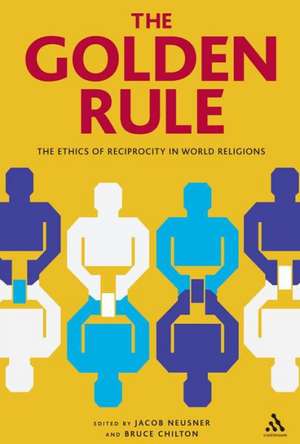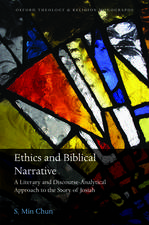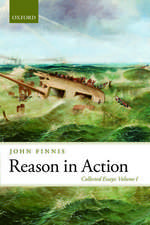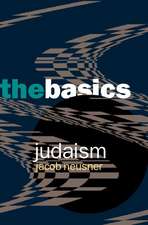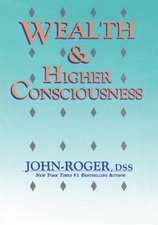The Golden Rule: The Ethics of Reciprocity in World Religions
Editat de Rabbi Jacob Neusner, Bruce D. Chiltonen Limba Engleză Paperback – 23 noi 2008
The Golden Rule: treat others as you would like to be treated. This ethical dictum is a part of most of the world's religions and has been considered by numerous religious figures and philosophers over the centuries. This new collection contains specially commissioned essays which take a fresh look at this guiding principle from a comparative perspective. Participants examine the formulation and significance of the Golden Rule in the world's major religions by applying four questions to the tradition they consider: What does it say? What does it mean? How does it work? How does it matter?
Freshly examining the Golden Rule in broad comparative context provides a fascinating account of its uses and meaning, and allows us to assess if, how and why it matters in human cultures and societies.
Freshly examining the Golden Rule in broad comparative context provides a fascinating account of its uses and meaning, and allows us to assess if, how and why it matters in human cultures and societies.
| Toate formatele și edițiile | Preț | Express |
|---|---|---|
| Paperback (1) | 236.84 lei 6-8 săpt. | |
| Bloomsbury Publishing – 23 noi 2008 | 236.84 lei 6-8 săpt. | |
| Hardback (1) | 947.11 lei 6-8 săpt. | |
| Bloomsbury Publishing – 23 noi 2008 | 947.11 lei 6-8 săpt. |
Preț: 236.84 lei
Preț vechi: 272.31 lei
-13% Nou
Puncte Express: 355
Preț estimativ în valută:
45.33€ • 47.14$ • 37.93£
45.33€ • 47.14$ • 37.93£
Carte tipărită la comandă
Livrare economică 15-29 martie
Preluare comenzi: 021 569.72.76
Specificații
ISBN-13: 9781847062963
ISBN-10: 1847062962
Pagini: 192
Dimensiuni: 156 x 234 x 18 mm
Greutate: 0.32 kg
Editura: Bloomsbury Publishing
Colecția Continuum
Locul publicării:London, United Kingdom
ISBN-10: 1847062962
Pagini: 192
Dimensiuni: 156 x 234 x 18 mm
Greutate: 0.32 kg
Editura: Bloomsbury Publishing
Colecția Continuum
Locul publicării:London, United Kingdom
Caracteristici
Considers an ethical approach of universal religious and general interest
Cuprins
Preface
1. Introduction: Parsing Reciprocity: Questions for the Golden Rule, William Scott Green, University of Miami, USA
2. The Golden Rule in Ancient Israelite Scripture, Baruch A. Levine, New York University, USA
3. Alternatives to the Golden Rule: Social Reciprocity and Altruism in Early Archaic Greece, Carolyn Dewald, Bard College, USA
4. The Golden Rule in Graeco-Roman Religion and Philosophy, Robert Berchman, Dowling College, USA
5. The Golden Rule in Classical Judaism, Jacob Neusner, Bard College, USA
6. The Golden Rule in Zoroastrianism, Mahnaz Moazami, Columbia University, USA
7. The Golden Rule and its Application, Bruce D. Chilton, Bard College, USA
8. The Golden Rule as the Law of Nature, from Origen to Martin Luther Olivier du Roy, Paris, France
9. The Golden Rule in Islam, Th. Emil Homerin, University of Rochester, USA
10. The Formulation and Significance of the Golden Rule in Buddhism [I], Kristen Scheible, Bard College, USA
11. The Golden Rule in Buddhism [II], Charles Hallisey, University of Wisconsin, USA
12. A Hindu Golden Rule, in Context, Richard Davis, Bard College, USA
13. The Golden Rule in Confucianism, Mark A. Csikszentmihalyi, University of Wisconsin-Madison, USA
14. "Wired for Reciprocity:" Some Concluding Reflections, William Scott Green, University of Miami, USA
1. Introduction: Parsing Reciprocity: Questions for the Golden Rule, William Scott Green, University of Miami, USA
2. The Golden Rule in Ancient Israelite Scripture, Baruch A. Levine, New York University, USA
3. Alternatives to the Golden Rule: Social Reciprocity and Altruism in Early Archaic Greece, Carolyn Dewald, Bard College, USA
4. The Golden Rule in Graeco-Roman Religion and Philosophy, Robert Berchman, Dowling College, USA
5. The Golden Rule in Classical Judaism, Jacob Neusner, Bard College, USA
6. The Golden Rule in Zoroastrianism, Mahnaz Moazami, Columbia University, USA
7. The Golden Rule and its Application, Bruce D. Chilton, Bard College, USA
8. The Golden Rule as the Law of Nature, from Origen to Martin Luther Olivier du Roy, Paris, France
9. The Golden Rule in Islam, Th. Emil Homerin, University of Rochester, USA
10. The Formulation and Significance of the Golden Rule in Buddhism [I], Kristen Scheible, Bard College, USA
11. The Golden Rule in Buddhism [II], Charles Hallisey, University of Wisconsin, USA
12. A Hindu Golden Rule, in Context, Richard Davis, Bard College, USA
13. The Golden Rule in Confucianism, Mark A. Csikszentmihalyi, University of Wisconsin-Madison, USA
14. "Wired for Reciprocity:" Some Concluding Reflections, William Scott Green, University of Miami, USA
Recenzii
Review in Journal of Contemporary Religion, Vol.25, no.2, 2010.
Neusner, Chilton, and their colleagues maintain a focused discipline on opening the conversation, entering the exploration, and generating questions for further study. One exits a reading of The Golden Rule with an expansive awareness of how the golden Rule starts with and extends beyond concern for self-dignity, invites expansive application beyond local kith and kin, invokes anticipatory action over simple reactive reciprocity, and urges people toward honor of the other and unitive human care.
"After reading this collection, there can be little doubt that this powerful rule has had an enormous influence in shaping religious beliefs throughout the centuries and around the world. This study lends credence to the principle that religions have at their core certain overarching concepts that emphasize basic ethical teachings and that instruct believers to act morally and honorably." --Jewish Book World, Winter 2009
Neusner, Chilton, and their colleagues maintain a focused discipline on opening the conversation, entering the exploration, and generating questions for further study. One exits a reading of The Golden Rule with an expansive awareness of how the golden Rule starts with and extends beyond concern for self-dignity, invites expansive application beyond local kith and kin, invokes anticipatory action over simple reactive reciprocity, and urges people toward honor of the other and unitive human care.
"After reading this collection, there can be little doubt that this powerful rule has had an enormous influence in shaping religious beliefs throughout the centuries and around the world. This study lends credence to the principle that religions have at their core certain overarching concepts that emphasize basic ethical teachings and that instruct believers to act morally and honorably." --Jewish Book World, Winter 2009
